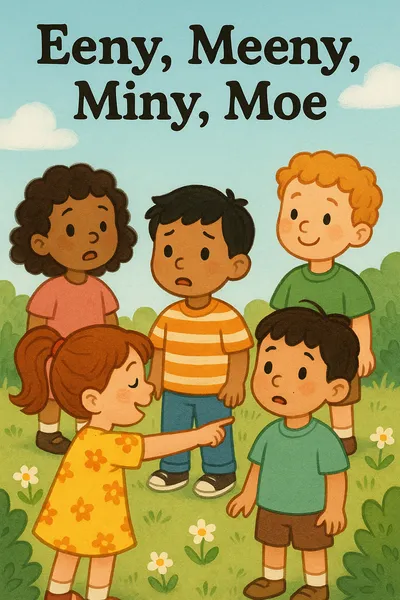Eeny, Meeny, Miny, Moe

Lyrics
Catch a tiger by the toe.
If he hollers, let him go,
Eeny, meeny, miny, moe.
History and Meaning
"Eeny, meeny, miny, moe" is a popular children's counting-out rhyme used to select a person or thing. The exact origin of the song is unknown, but it has existed in various forms and languages since well before 1820.
Celtic Sacrifice theory
Many believe it originated from ancient Celtic rituals used to sort out who would be chosen for sacrifice. In this theory, the words "eeny, meeny, miny, moe" might have come from the Celtic words for the numbers "one, two, three, four."
Fishermen Counting System
It has also been suggested that "eeny, meeny, miny, moe" can be traced back to an old British counting system known as the Anglo-Cymric Score, which was used by fishermen, shepherds, farmers, and women keeping track of knitting rows.
Racist Mis-use
The diversity of its origins is plausible but contested, and the second line of the American version, "Catch a tiger by the toe," has a dark history of being a racial slur against Black people. The offensive variation was widely used until the 1950s when kid-friendly versions using words like tiger, tinker, and piggy became more commonplace.
Modern Use
Today "Eeny, meeny, miny, moe" is a popular counting-out rhyme that is often used by children to choose someone or something in a game or decision-making process.
To play the game, one person starts chanting the rhyme while pointing to each participant or object in turn. On the last word, the person who is being pointed at is either chosen or eliminated, depending on the context of the game. For example, in a game of tag, the person who is chosen may be "it" and must chase the other players, while in a decision-making process, the person who is chosen may get to make a choice or decision.
Today, "Eeny, meeny, miny, moe" is often played by children during recess or other free time. It's a simple and fun game that can be played with any number of participants. While the origins of the rhyme may be controversial, the game has evolved into a harmless and enjoyable pastime for kids.